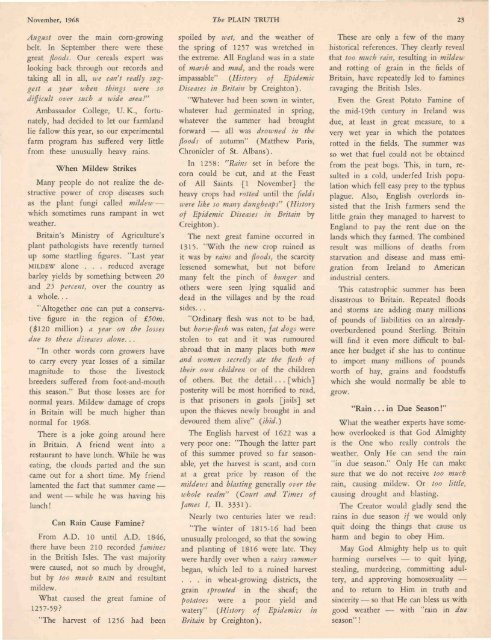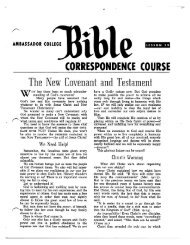The Generation Gap-WHY? - Herbert W. Armstrong
The Generation Gap-WHY? - Herbert W. Armstrong
The Generation Gap-WHY? - Herbert W. Armstrong
You also want an ePaper? Increase the reach of your titles
YUMPU automatically turns print PDFs into web optimized ePapers that Google loves.
N ovember , 1968<br />
Allgllst over the main com-g rowing<br />
belt. In September there were these<br />
great floods. Our cereals expert was<br />
looking back through our records and<br />
taking all in all, we can't really J/lggel<br />
t a year when things were so<br />
diffic/llt otter s/lch a wide area!"<br />
Ambassador College, U. K., fortunately,<br />
had decided to let our farmland<br />
lie fallow this year, so our experimental<br />
farm program has suffered very little<br />
from these unusually heavy rains.<br />
When M ildew Strikes<br />
Many people do not realize the destructive<br />
power of crop diseases such<br />
as the plant fungi called mildew <br />
which sometimes runs rampant in wet<br />
weather.<br />
Britain's Ministry of Agriculture's<br />
plant pathologists have recently turned<br />
up some start ling figures. " Last year<br />
M ILDEW alone . . . reduced average<br />
barley yields by something between 20<br />
and 2.5 percent, over the country as<br />
a whole.. .<br />
"Altogether one can put a conservative<br />
figure in the region of £.50m.<br />
($ 120 million ) a year 011 the losses<br />
due to these diseases alone. . .<br />
" In other words corn growers have<br />
to carry every year losses of a similar<br />
magnitude to those the livestock<br />
breeders suffered from foot-and-mouth<br />
this season." But those losses are for<br />
normal years. Mildew damage of crops<br />
in Britain will be much higher than<br />
normal for 1968.<br />
<strong>The</strong>re is a joke going around here<br />
in Britain. A friend went into a<br />
restaurant to have lunch. While he was<br />
eating, the clouds parted and the sun<br />
came out for a short time. My friend<br />
lamented the fact that summer came <br />
and went - while he was having his<br />
lunch !<br />
Can Rain Cause Famine ?<br />
From A.D . 10 until A.D. 1846,<br />
there have been 210 recorded famines<br />
in the British Isles. <strong>The</strong> vast majority<br />
were caused, not so much by drought,<br />
but by too milch RA IN and resultant<br />
mildew.<br />
What caused the great famine of<br />
1257-59 ?<br />
"<strong>The</strong> harvest of 1256 had been<br />
<strong>The</strong> PLAI N TRUTH<br />
spoiled by wet, and the weather of<br />
the spring of 1257 was wretched 10<br />
the extreme. All England was in a state<br />
of marsb and mnd, and the roads were<br />
impassable" (Histo,.y of Epidemic<br />
Diseases in Britain by Creighton) .<br />
"Whatever had been sown in winte r,<br />
whatever had germinated in spring,<br />
whatever the summer had brought<br />
forward - all was drown ed in the<br />
floods of autumn" ( Matthew Paris,<br />
Chronicler of St. Albans) .<br />
In 1258: " RaiJ1J set in before the<br />
corn could be cut, and at the Feast<br />
of All Saints [1 No vember} the<br />
heavy rrups had rolled until the fields<br />
were like so man)' dlm gheaps" ( His tory<br />
of Epidemic Diseases in Britain by<br />
Creighton) .<br />
Th e next great famine occurred 10<br />
1315. "Wit h the new crop ruined as<br />
it was by rains and floods, the scarcity<br />
lessened somewhat, but not before<br />
many felt the pinch of hunger and<br />
others were seen lying squalid and<br />
dead in the villages and by the road<br />
sides...<br />
"Ordinary flesh was not to be had,<br />
but horse-flesh was eaten, fat dogs were<br />
stolen to eat and it was rumoured<br />
abroad that in many places both men<br />
and u'omen secretly ate the flesh of<br />
their ou-n children Or of the children<br />
of others. But the detail . .. [which}<br />
posterity will be most horrified to read,<br />
is that prisoners in gaols [ jails] set<br />
upon the thieves newly brought in and<br />
devoured them alive" (ibid.)<br />
<strong>The</strong> English harvest of 1622 was a<br />
very poor une: "Though the latter part<br />
of this summer proved so far seasonable,<br />
yet the harvest is scant, and corn<br />
at a great price by reason of the<br />
mildeu-s and blasting generally Ot' ef the<br />
whole realm" (C OIl/·t and Times of<br />
[antes I, II. 333 1) .<br />
Nea rly two centuries later we read:<br />
"<strong>The</strong> winter of 1815-16 had been<br />
unusually prolonged, so that the sowing<br />
and planting of 1816 were late. <strong>The</strong>y<br />
were hardly over when a rain)' sum mer<br />
began, which led to a ruined harvest<br />
. . . in wheat-growing districts, the<br />
grain sprouted in the sheaf; the<br />
potatoes were a poor yield and<br />
watery" (History of Epidemics ill<br />
Britain by Creighton) .<br />
23<br />
Th ese are only a few of the many<br />
historical references. <strong>The</strong>y clearly reveal<br />
that too milch rain, resulting in mildew<br />
and rotting of grain in the fields of<br />
Britain, have repeatedly led to famines<br />
ravaging the British Isles.<br />
Even the Great Potato Famine of<br />
the mid-19th century in Ireland was<br />
due, at least in great measure, to a<br />
very wet year in which the potatoes<br />
rotted in the fi elds. <strong>The</strong> summer was<br />
so wet that fuel could not be obtained<br />
from the peat bogs. This, in turn, tesuIted<br />
in a cold, underfed Irish population<br />
which fell easy prey to the typhus<br />
plague. Also, English overlords insisted<br />
that the Irish farmers send the<br />
little grain they managed to harvest to<br />
England to pay the rent due on the<br />
lands which they farmed. Th e combined<br />
result was millions of deaths from<br />
starvation and disease and mass emigration<br />
from Ireland to American<br />
industrial centers.<br />
T his catastroph ic summer has been<br />
disastrous to Britain. Repeated floods<br />
and storms are adding many millions<br />
of pounds of liabilities on an already.<br />
overburdened pound Sterling. Britain<br />
will find it even more difficult to balance<br />
her budget if she has to continue<br />
to import man)' millions of pounds<br />
worth of hay, grains and foodstuffs<br />
which she would normally be able to<br />
grow .<br />
" Rain . . . in Due Season !"<br />
W hat the weather experts have somehow<br />
overlooked is that God Almighty<br />
is the One who really controls the<br />
weather. Only He can send the rain<br />
" in due season." Only He can make<br />
sure that we do not receive too mucb<br />
rain, causing mildew. Or / 0 0 IiI/Ie,<br />
causing drought and blasting.<br />
<strong>The</strong> Creator would gladly send the<br />
rains in due season if we would only<br />
quit doing the things that cause us<br />
harm and begin to obey Him.<br />
May God Almighty help us to quit<br />
harming ourselves - to quit lying,<br />
stealing, murdering, committ ing adultery,<br />
and approving homosexuality <br />
and to return to Him in truth and<br />
sincerity - so that He can bless us with<br />
good weather - with "rain in due<br />
season" !

















